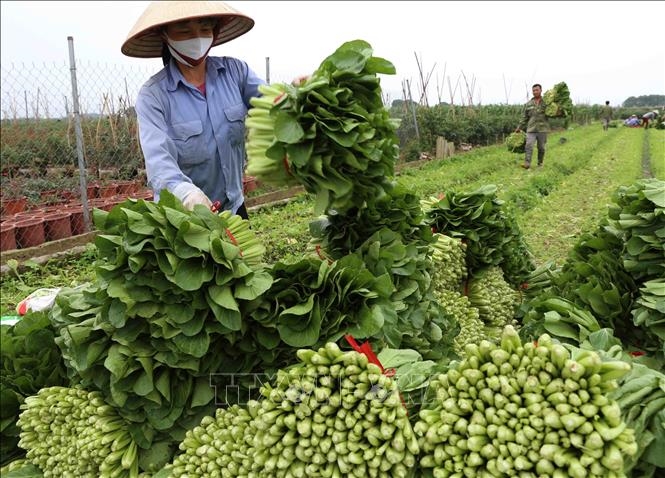 |
| Farmers in Hanoi harvest vegetables. (Photo: VNA) |
Dual benefits from safe production
At Nguyen Thi Lien’s farm in Phu Cuong commune, Soc Son district, seemingly novel practices such as using earthworms to feed livestock and playing music for pigs are already in place. These methods result in a monthly supply of about one ton of earthworm seed, 100 kilograms of dried earthworms, and four tons of pork, generating approximately VND2 billion in revenue. Importantly, all livestock waste is treated with biological products, preventing environmental pollution.
In Thuong Coc Commune, Phuc Tho district, Nguyen Van Mo's black grape farming model not only ensures food safety but also offers high economic value. The entire black grape cultivation process follows VietGAP standards. To optimize grape growth and resilience to weather conditions, advanced technologies are employed, such as water-saving irrigation and controlled temperature and lighting systems. With an area of 1,500 square meters and 600 grape vines, each harvest yields 15 to 20 tons, generating over VND500 million per harvest.
To expand safe green agricultural production models, according to Vu Thi Huong, Director of Hanoi Agricultural Promotion Center, since the beginning of 2024, the center has implemented 18 agricultural promotion models (10 crop cultivation, four livestock, four aquaculture). These models primarily focus on organic and VietGAP standards for vegetable, flower and fruit production, applying high technology; adapting agricultural production to climate change and environmental protection; and meeting market demands. Enterprises, cooperatives, farms and farmers have increasingly adopted sustainable production practices, including improved cultivation techniques, integrated pest management (IPM), and proper pesticide use, reducing inorganic fertilizer usage.
Continuing to overcome challenges
To expand green agricultural models, Dong Thi Vinh, Director of Hong Ha Safe Vegetables and Fruits Cooperative (Phu Xuyen district), suggests that functional sectors prioritize funding from the national target program for new rural development annually to support cooperatives in green agricultural production. Additionally, cooperatives should be guided on registering processes, completing labels, packaging and traceability stamps, contributing to building brand names for agricultural products. Developing and implementing a trading platform specializing in safe agricultural products is crucial to connecting producers, cooperatives and consumers.
Nguyen Thi Tuyet Anh, Head of the Thanh Tri District Economic Department, emphasizes continuous support for cooperatives and farmers on safe production processes, particularly in caring for plants and animals, controlling pests and diseases, and reducing the use of chemical fertilizers, pesticides and antibiotics. This approach aims at producing clean and safe products according to VietGAP (Vietnamese Good Agricultural Practices) standards. Enhancing cooperation, investment promotion, trade and market development for agricultural products will create favorable conditions for farmers, enterprises and investors to produce high-quality, safe agricultural products that meet market demands.
Nguyen Dinh Hoa, Deputy Director of Hanoi Department of Agriculture and Rural Development, states that Hanoi's agricultural sector is focusing on restructuring production, improving the quality, value, and efficiency of key agricultural products. Efforts include promoting the "One Commune One Product" (OCOP) program, digital transformation in agriculture, implementing effective mechanisms and policies to boost production, and applying and transferring scientific and technological advances. The sector is transitioning from a production mindset to an economic mindset, aiming for green values created from green transformation, green consumption and a green economy./.